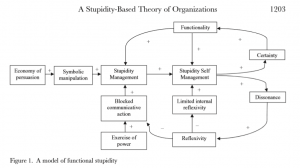TSElosophers meeting 30.1.2019. Kari Lukka and Otto Rosendahl.
Alvesson, M., & Spicer, A. (2012). A stupidity‐based theory of organizations. Journal of management studies, 49(7), 1194-1220.
This time TSElosophers discussed the article by Mats Alvesson & Andrew Spicer entitled “A Stupidity-Based Theory of Organizations”, published in Journal of Management Studies in 2012. In brief, this article introduces the notion of “functional stupidity” to complement the earlier understanding of the limitations of rationality in decision-making and action in organizations. Alvesson & Spicer particularly stress how functional stupidity adds to this by including affects and power issues into the picture. Functional stupidity is defined as “an absence of reflexivity, a refusal to use intellectual capacities in other than myopic ways, and avoidance of justifications”.
The article also suggests a system dynamics model dealing with how functional stupidity works in organizations. The model includes two levels of analysis, the organizational stupidity management and the individuals’ stupidity self-management, which is reinforced by the organizational stupidity management, see figure 1 below. Stupidity self-management involves “putting aside doubts, critique, and other reflexive concerns and focusing on the more positive aspects of organizational life […] that are officially sanctioned and actively promoted.” (Please refer to the original article for explanation of other concepts in the figure below.)

The system dynamics of the model were only preliminarily discussed. Future research suggestions reflect the work-in-progress: authors suggest studies on functional stupidity evolving over time and individual’s stupidity self-management process towards greater/lesser reflexivity. This future research adds the idea of delay to system dynamic model. An interesting point of delay is between “reflexivity” and “limited internal reflexivity”. For example, organizations that curb stupidity management might expect a considerable delay before individuals start to demonstrate greater reflexivity.
TSElosophers were not entirely convinced of the analytical originality or strength of the article. Firstly, the difference from the already recognized forms of limitations to rationality in decision-making, taken the latter as a whole, does not seem that big. Secondly, the article does not develop the aspects that are claimed to make the major differences, i.e. affects and power issues, to any notable depth. Thirdly, there is much similarity between the notion of “functional stupidity” and that of “action rationality” of Nils Brunsson, introduced in his article in Journal of Management Studies in 1982 and his book from 1985. Both of these mean essentially wiping aside time-consuming and complicating reflection and profound analysis in order to get ahead in action and to get something done.
TSElosophers speculated about three archetypes of organizational participants with a view of functional stupidity. One of them sees through the system and, stressing the need to reflect and to offer justifications that are defendable in the long-term, takes distance to functional stupidity, even being active in counter-acting it. This may of course lead also to just cynicism or even leaving the organization. A second archetype would basically hold similar core views, but also appreciates the upsides of functional stupidity and therefore keeps normally low profile regarding countering its mechanisms. However, people representing this second archetype may still selectively choose to also resist functional stupidity, when they view resisting more necessary or beneficial than just accepting it. The third archetype refers to organizational participants who either very much buy the upsides of functional stupidity and therefore dismiss the downsides or do not recognize functional stupidity at all, but only behave in the organizational life as functional stupidity suggests/requires.
TSElosophers generally found this article interesting and inspiring. The buzzword at the heart of it is striking enough to raise immediate attention – especially as it seems to include an oxymoron: How can stupidity be functional? The article is pretty compelling regarding the argument that such functional stupidity can indeed have many “positive effects” regarding the smooth functioning of organizations, and that without it, managing modern organizations would be cumbersome. To some extent the article also deals with the other side of the coin: Stupidity, even with such streamlining and simplifying functionalities as depicted in the article, has also downsides. However, it is somewhat surprising – from researchers that are known of their critical approach – how much the article stresses the “positive effects” of stupidity, making the article notably more (short-term) managerially than critically tuned. This is in some contrast to the book on a similar theme by the same authors from 2016, titled “The stupidity paradox” (Profile Books). The book is much more balanced with a view of the upsides and downsides of functional stupidity.
Leave a Reply